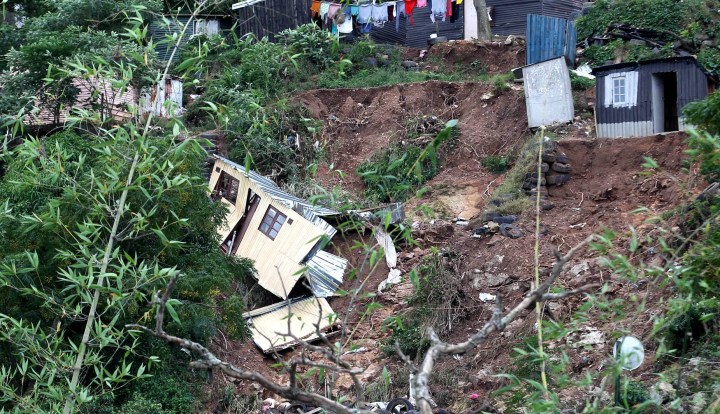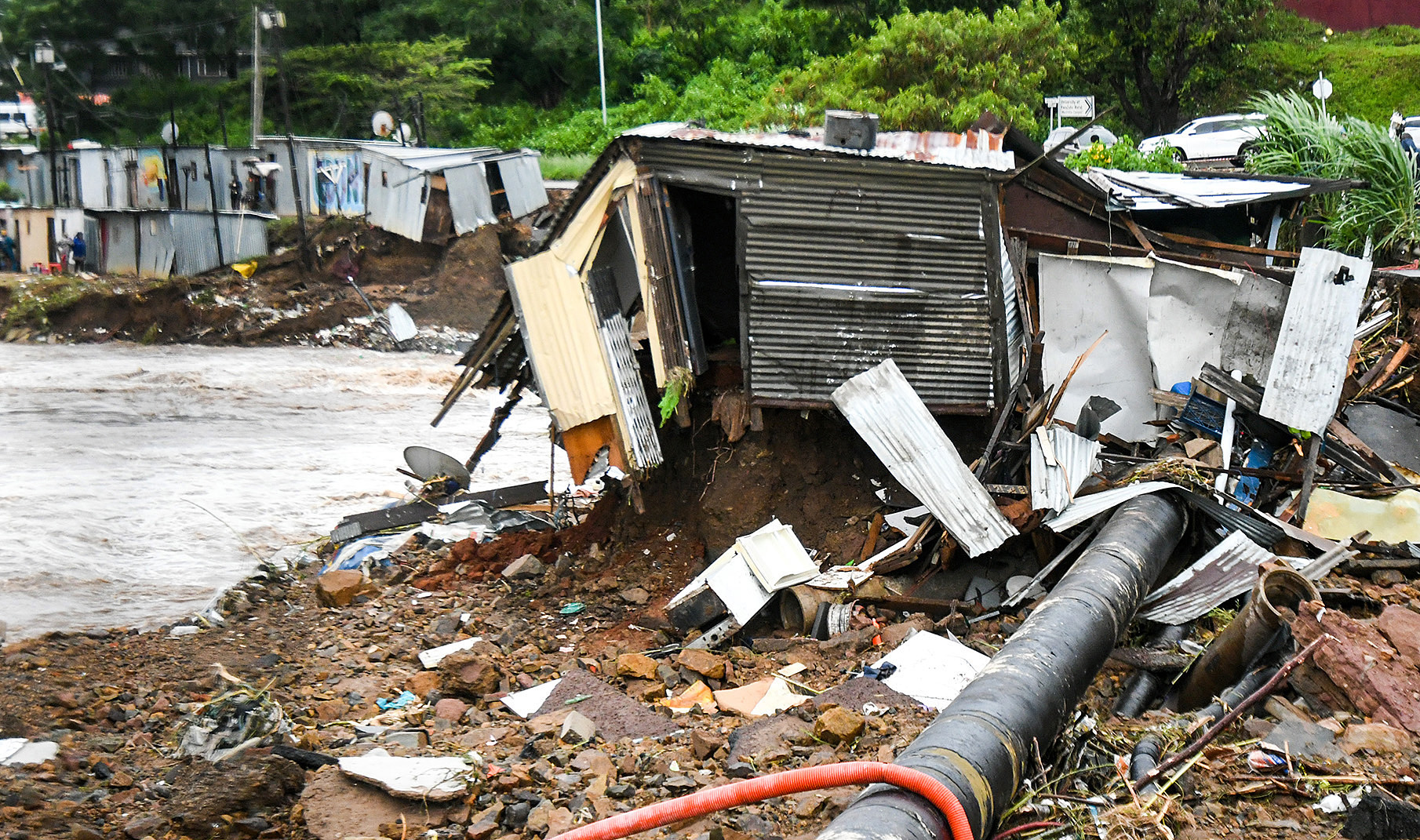BHEKISISA
KZN flood victims’ fates were sealed years ago

Inexorable climate change, torrential rains and an incompetent municipality conspired to produce the perfect storm for thousands of people in KwaZulu-Natal.
Nokwazi Mbambo, 19, was in her bed in Lindelani, an informal settlement in Durban, listening to the rain thundering down on the corrugated iron roof of her family’s shack.
She got up and went to cuddle next to her mother for comfort.
Someone began knocking on the door. Mbambo and her mom ignored it, willing themselves to fall asleep.
Then they heard someone shouting.
Her mother got up and went to the door, Mbambo close behind. Their frantic neighbour was standing on their doorstep. He was frantic. “Your house is moving!” he shouted.
The next moment, there was a powerful gust of wind and a loud bang.
The corrugated iron roof that sheltered the Mbambos only seconds ago had blown away in the storm.
They scrambled through the door, grabbing a few things as they fled.
From the relative safety of her neighbour’s house, where they spent the night, Mbambo watched as her shack was washed away.
Temporary shelter, six months later
“I lost everything. My school books, my ID, even my laptop,” the teenager recounts. She was speaking to Bhekisisa at a temporary shelter in the Ntuzuma F district community hall, about 15km from her former home.
The hall was made available for some of those who had been displaced by the devastating floods, a disaster that left 448 people dead and more than 8,500 homes destroyed.
The community hall was meant to be temporary arrangement. Now, six months later, Mbambo and her mom are losing hope that they will ever find somewhere else to live.

Shacks washed away at the informal settlement between the M19 and Quarry Road in Durban on 12 April 2022. (Photo: Gallo Images / Darren Stewart)
Outside the hall, tents have been set up to accommodate smaller families.
Not far away, on the streets of Durban’s central business district, is 32-year-old Mfundo Shezi. On the night of the floods, while desperately searching for shelter from the storm, he watched as his ID and a month’s supply of HIV medication were washed away.
“I lost my ID book… even all my blankets and clothes were washed away… my medication. I had a container for a whole month of [antiretroviral] tablets.”
COP27
Meanwhile, almost 9,000km away in the Egyptian coastal resort of Sharm el-Sheikh, world leaders are gathered for the 2022 United Nations Climate Change Conference (COP27).
Africa is a region likely to bear the brunt of a changing climate due to the earth getting warmer since countries began burning coal to fuel their economies around the mid 1800s, experts say.
A storm such as the one that caused the KwaZulu-Natal floods, for instance, could be twice as likely compared with 150 years ago, when the atmosphere’s average temperature was 1.2°C lower, according to scientists at the World Weather Attribution Service.
In Egypt, politicians will make plans — once again — to keep to the goal of the Paris Agreement, which came into effect in 2016 and aims to prevent the average global temperature from rising by more than 2°C above pre-industrial levels.
The Paris Agreement was adopted by 196 countries, including South Africa, and is legally binding.
The treaty says we should aim to keep within a 1.5°C rise, as this would curb the worst effects of climate change. We need to do this by reducing the amount of fossil fuels we burn that emit greenhouse gases into the atmosphere. Gases like carbon dioxide and nitrous oxide trap heat in the atmosphere, making the planet warmer.
Way off on Paris Agreement targets
But it’s already too late for Mbambo and her community. She says her life has been changed forever. A report released in 2021 shows that people like Mbambo and her mother are among many who risk facing such floods — the world is way behind on achieving the Paris Agreement’s targets.
The report shows there’s a 50/50 chance that temperatures will exceed the 1.5 degree mark in the next five years.
But if we can reduce carbon dioxide emissions drastically until 2050, or even stop them from increasing after 2050, it is still possible to stay on track.
In September 2021, South Africa released a revised version of the action plan which signatories of the Paris Agreement must set up. The Nationally Determined Contribution (NDC) is more ambitious than the pledges made in 2015: instead of capping our emissions to the equivalent of up to 510 million tonnes of carbon dioxide by 2030, we’re now allowing ourselves to only go up to 420 million tonnes.
Data from Climate Action Tracker, however, shows that despite the revised cuts, South Africa will not reduce emissions sufficiently to meet its NDC target range for 2030.
Post-disaster struggles
Meanwhile, back at the shelter outside Durban, Mbambo says she struggles to concentrate while studying because there are children running around and playing in the community hall. Some days she doesn’t even go to her college, she says, because she’s often short on transport money.
At the same time, Shezi’s health has taken a knock. He went two weeks without ARVs because the nonprofit centre where he gets the drugs, TB HIV Care, was closed due to the floods.
Having lost his ID in the floods, he was turned away from a local hospital where he had hoped to receive a fresh supply of antiretrovirals. Administrators need this document to open a file for those who aren’t already in their system.
Visit Daily Maverick’s home page for more news, analysis and investigations
This was the first time since starting treatment in 2021 that he hadn’t taken his medication every day.
At her “temporary” home, Mbambo says she feels grateful for shelter from the rain, for having a mattress which she shares with her mom, and for the food they receive every day. There is also a clinic down the road.
But she wants her old life back, she says, wrapping her pink gown tightly around her body.
Wearing a pair of slippers, she begins climbing the stairs leading back into the community hall.
The eThekwini council promised to provide housing for flood victims shortly after the disaster. Everyone is still waiting.
“I want to start afresh next year.” DM/MC
This story was produced by the Bhekisisa Centre for Health Journalism. Sign up for the newsletter.






















 Become an Insider
Become an Insider
Comments - Please login in order to comment.